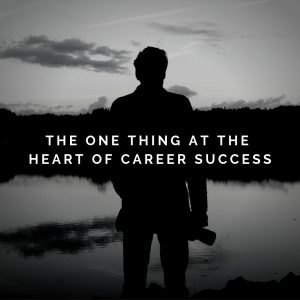The One Thing at the Heart of Career Success
 Recently I read an article entitled, The 10 Worst Jobs in Science. These distinguished jobs included that of armpit detective, a position at Florida International University to “study human odors, mainly from the underarm, to try to isolate the compounds that give us our unique aroma.” Also listed was the feces piper, a hospital position which involves transplanting fecal matter from a healthy patient through a tube into a sick person, in hopes the good bacteria can wipe out the infected bacteria. Then there’s the oceanic snot divers, scientists from Italy’s Polytechnic University who dive in the Adriatic Sea to collect samples of “gelatinous masses of dead plankton and decaying cell material that look like large loogies and smell of seafood and decomposing eggs.” 22
Recently I read an article entitled, The 10 Worst Jobs in Science. These distinguished jobs included that of armpit detective, a position at Florida International University to “study human odors, mainly from the underarm, to try to isolate the compounds that give us our unique aroma.” Also listed was the feces piper, a hospital position which involves transplanting fecal matter from a healthy patient through a tube into a sick person, in hopes the good bacteria can wipe out the infected bacteria. Then there’s the oceanic snot divers, scientists from Italy’s Polytechnic University who dive in the Adriatic Sea to collect samples of “gelatinous masses of dead plankton and decaying cell material that look like large loogies and smell of seafood and decomposing eggs.” 22
When starting out to university at the tender young age of 18, does anyone have any idea they could end up as an armpit detective or an oceanic snot diver? How exactly do we move from a vague, unformed, adolescent phase which typifies the American high school graduate, into the highly complex process of sorting out the many different kinds of jobs and careers and finally to identifying a career direction suitable for a specific individual?
Frederick Buechner points out a major problem with identifying your individual call is that “There are all different kinds of voices calling you to all different kinds of work, and the problem is to find out which is the correct voice.” Buechner goes on to say, “a good rule for finding out is this. The kind of work you are best called to, is the kind of work (a) that you most need to do and (b) that the world most needs to have done. If you really get a kick out of your work, you’ve presumably met requirement (a), but if your work is writing TV deodorant commercials, the chances are you’ve missed requirement (b). On the other hand, if your work is being a doctor in a leper colony, you have probably met requirement (b), but if most of the time you’re bored and depressed by it, the chances are you have not only bypassed (a) but probably aren’t helping your patients much either.” 23
Finding your sweet spot in career and vocation involves a great many issues and requires study, analysis, and multi-faceted decision making on your part. Yet, at the heart of this process, there is only one critical piece you have to figure out to find career success. Peter Drucker describes this critical element thusly: “To know one’s strengths, to know how to improve them and to know what one cannot do – this is the key to continuous improvement.” 24 Identifying your main strengths, this is the one thing you must do to build a successful and satisfying work life. Your weaknesses don’t really matter. All the things people do to throw obstacles in your career path, these won’t ultimately knock you off track, so long as you find and build on the one main thing: your unique strengths as a person.
22 Betty Klinck, Researchers Get Down And Dirty,” USA Today (March 22, 2010), 5-D.
23 Buechner, Frederick, Listening to Your Life, 1993. Harper One, NY, NY, p.185-186.
24 Drucker, Peter F., The Effective Executive, 2007. Harper & Row, NY, NY, p72.
